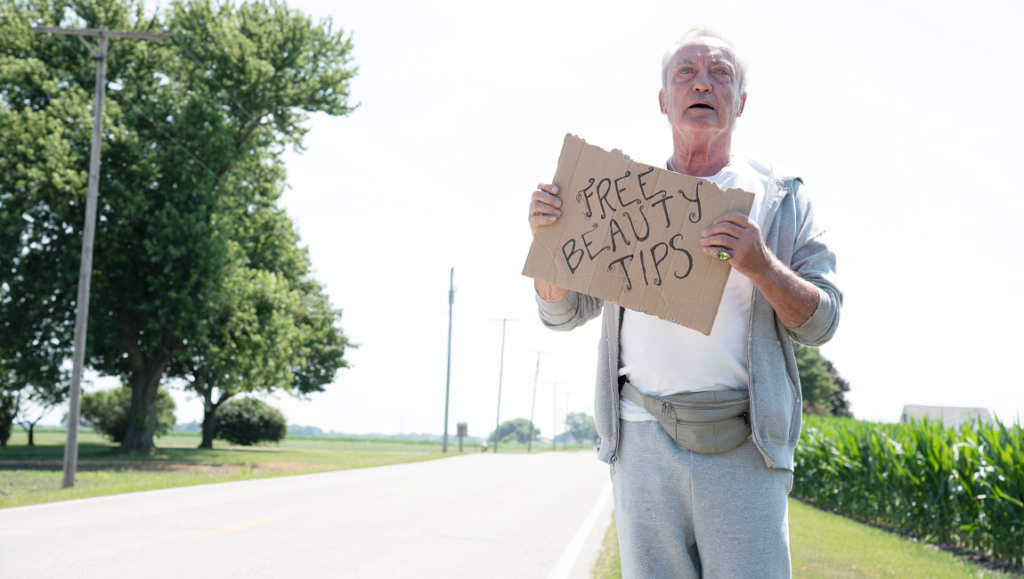Swan Swan‘s good intentions get lost amid its tonal disarray and narrative faceplants.
Character actor extraordinaire Udo Kier takes center stage in Swan Song, writer-director Todd Stephens’ affectionate snapshot of “true life icon” Pat Pitsenbarger, a Sandusky, Ohio hair stylist and local gay icon. The film finds Pitsenbarger in the final stages of a fabulous life gone humdrum thanks to old age and failing health. Living out his life in a nursing home, where the only thrill to be found is sneaking More-brand cigarettes, Pat’s long-dormant styling services are called upon once more upon the death of wealthy socialite Rita Parker Sloan (Linda Evans). A provision in her will states that Pat is the only one allowed to do her final hair and make-up, even though the two had a dramatic falling-out decades before. With the promise of $25,000, Pat makes the journey on foot, encountering all sorts of unique individuals along the way that force him to confront both long-buried resentments and a city he barely recognizes.
Swan Song is, at its core, a loving ode to Sandusky, Stephens’ hometown and the setting for the majority of his filmography. Filmed on location, anyone familiar with the area will recognize its various streets and storefronts, while newcomers will likely glean a sense of the town’s warmth and generosity as it spills forth from the frame. Kier’s portrayal of Pitsenbarger is equally distinctive, imbuing the character with a quiet dignity that radiates from beneath a larger-than-life persona. Old age may have taken its toll, but even with the occasional limp, Pat is a force of nature that sashays into any room and instantly commands attention, eyes locked on him and him alone. (Admittedly, the lime-colored pantsuit Pat picks up mid-film takes some of the credit.) Swan Song is clearly Stephens’ gay take on, ironically enough, The Straight Story, David Lynch’s gentle yet stirring portrait of Middle America. Stephens, however, is no Lynch. It’s obvious that the director feels great affection for Pitsenbarger, and the film goes to great pains to show how this one man, both intentionally and inadvertently, did so much for gay rights in this small conservative town — and, by extension, men like Stephens — by simply living his life on his own terms, prejudices be damned. Such stories are worth telling because of what they represent to so many whose struggles have long been lost to time’s passing, even as they paved the way for our present.
But, of course, good intentions alone do not make good films, and Swan Song is a fair bit of mess. For every moment that works — such as Pitsenbarger visiting the grave of his deceased partner for the first time, finding himself overcome with memories of the past — there are three others that fall flat. Part of the problem lies in the fact that many of the individuals with whom Pitsebarger crosses paths simply aren’t that interesting, with the quality of these performances varying wildly and proving sometimes distracting due to the use of local non-actors. It makes the appearance of pros such as Evans, Micheal Urie, and Jennifer Coolidge borderline jarring (although the latter practically walks away with the film in only two scenes, delivering a rare dramatic performance that absolutely rivets). The film is likewise in tonal disarray, whipping back and forth between melancholy and slapstick at a moment’s notice. Perhaps forcing Kier to put on a metal helmet made of an old chandelier, then having it burst into flames, was not the most dignified choice, although expectations should obviously be tempered for the director of Another Gay Movie. Swan Song has its heart in the right place, to the point that criticizing it feels almost like kicking a puppy, but such true-life icons deserve better memoriams than this.
Originally published as part of SXSW Film Festival 2021 — Dispatch 4.


Comments are closed.